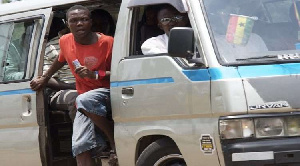The Driver and Vehicle Licensing Authority (DVLA) has hinted at plans to implement the controversial mandatory seatbelt for each passenger in commercial vehicles next year.
Section 119 of the Road Traffic Regulation Legislative Instrument (LI) 2180 passed by Parliament in 2012, lays emphasis on the use of seatbelts.
It is expected to achieve a 50 per cent reduction in deaths and serious injuries associated with vehicle accidents by 2020.
However, attempt to implement the policy in September 2014 was fiercely resisted by commercial vehicle operators.
DVLA announced then that, it was not going to register new vehicles meant for public passenger service which were without seatbelts fitted to each seat.
The authority also planned not to renew the roadworthiness of commercial vehicles which do not have seatbelts fitted to each seat.
DVLA jettisoned the implementation due to the chaotic resistance.
However, speaking in Koforidua Thursday, November 11, 2022 during the opening ceremony for training of accident and Traffic enforcement officers and DVLA Technician Engineers drawn from the Central, Central East, Tema, Accra, Volta, and Eastern Regions, the Deputy Chief Executive Officer at DVLA Prince Opoku Adusei said the authority has successfully gone through the approval section for implementation that was waiting for final clearance from the Ministry of Finance for procurement processes hence hopeful the policy will be implemented next year.
“DVLA has successfully gone through the approval section of implementation of seatbelts in commercial vehicles.Waiting for the final clearance from the Ministry of Finance to continue with procurement process. Very soon, hopefully, next year, we shall come back to you again fashion out a way to ensure smooth implementation of this very very important policy. This especially affects vehicles that come as Vans which are converted to passenger vehicles ” The Deputy CEO said.
Additionally, he said, consultation processes are ongoing for the installation of road speed limiters and tachographs in Commercial and goods-carrying vehicles.
He also announced a new licensing regime for commercial drivers to ensure that drivers get license for specific type of vehicle they drive.
The Deputy CEO of DVLA, Prince Opoku Adusei, revealed ongoing consultation and concept development for the introduction of stimulation driving test project to test drivers ability to drive at night, during rain, and drive on mountainous or hilly and curvy roads among others before given license.
The stimulation test he said will enable DVLA to issue direct licenses to qualified applicants without starting from lower category.
In reaction, the chairman of the Eastern Regional Branch of Ghana Private Road Transport Union (GPRTU) Johnson Kyereh called on DVLA to hasten slowly, particularly on the implementation of the compulsory seatbelts for wider consultation and education for effective corporation.
He said, fixing seatbelts for passengers in vehicles that were not originally fitted with is very expensive hence government should subsidize same.
Eastern Regional Head of National Road Safety Authority Dennis Yirebu said, Ghana’s desire to halt and reverse fatality rate of road traffic crashes by 2020 has been missed as Ghana still records more than a 1000 deaths every year.
He added ” A major intervention of the NRSA and partners to address the situation and thereby achieve the target by 2030 as its in line with the SDGs has been the launch of the Stay Alive Campaign which has drawn a concept involving sister organizations and partners in a united front to minimize or at best stop this monster of a phenomenon called road crashes. The campaign has its theme ‘gyae obonsam adwuma’, to wit, ‘stop doing the devil’s bidding”.
Dennis Yirebu said more than 80% of crashes on Ghana’s roads emanate from wrongful human behaviour.
He however revealed positive results in renewed efforts to reduce the crashes.
“Statistically, Ghana has recorded reductions in our Crashes, Injuries, and Deaths) from January to September 2022 compared to same period 2021. There was 6.09% reduction in crashes, 1.2% in injured persons, and significantly 17.08% reduction in fatality.”
Source: Ghana/Starrfm.com.gh
 Home Of Ghana News Ghana News, Entertainment And More
Home Of Ghana News Ghana News, Entertainment And More





